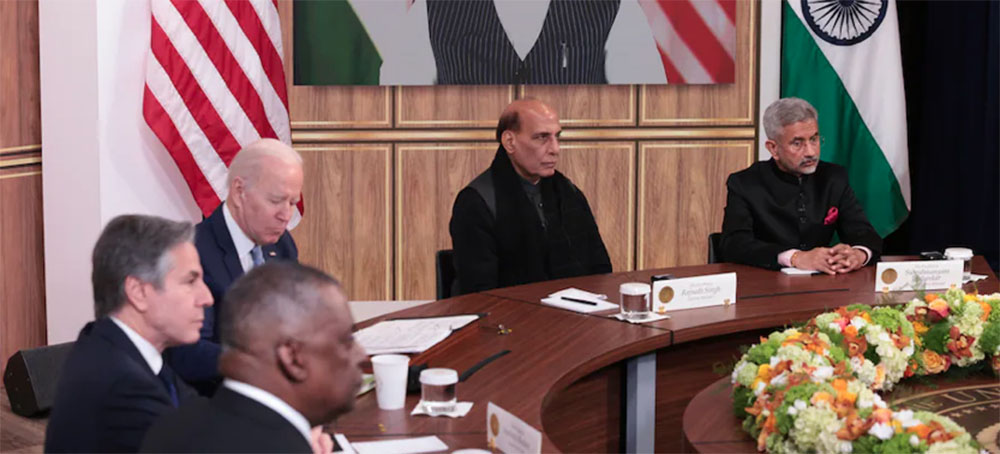Live on the homepage now!
Reader Supported News
Jack Teixiera's turn from online racist to alleged classified-document leaker shouldn't be surprising
While Republicans in Congress have played down the risk of extremists in the military, experts who follow the issue say they’re not surprised to see extremist beliefs and leaks of classified information coincide. In a 2021 hearing on extremism in the armed forces, Republican members of Congress wondered aloud whether the issue had really “proven itself to be a major problem” or whether the issue was merely “political theater” for Democrats to enforce a partisan ideological discipline on the armed services. Republicans in the House and Senate have blasted Secretary of Defense Lloyd Austin’s training efforts to root out extremism and voted against legislation to track “white-supremacist and neo-Nazi activity in the uniformed services.”
“I don’t think we should be surprised at all,” says Don Christensen, a retired Air Force colonel who served as the Air Force’s chief prosecutor. “It’s clear that we at least have a subculture of racism and antisemitism within the military, and that there are people who are willing to act out by sharing classified information or making terroristic threats against those minorities or Jewish people.”
The military is one of the nation’s most diverse organizations, and only a small percentage of servicemembers are racially motivated extremists. But when it comes to leaks, even a handful of white nationalists can do a lot of damage.
Teixeira’s racism appears to have been more of an individual project, rather than organized, like other racist members of the military who have recently faced charges. A video of him at a shooting range obtained by The Washington Post showed the Air National Guardsman yelling racist and antisemitic slurs while popping off rounds at a shooting range. And on his Discord servers, users regularly posted similar memes. In a detention memo filed late Wednesday, prosecutors alleged that local police had denied him a gun permit because of violent, racist threats he made in high school remarks and had discussed building an “assassination van and an urge to “kill a [expletive] ton of people.”
It’s unclear what made Teixeira post volumes of sensitive documents on social media. He embraced right-wing conspiracy theories. including a false claim that the white supremacist massacre at a Buffalo grocery store was part of a secret government plot. But he mostly appeared keen to share classified documents in order to revel in the awe of the young teenagers who looked up to the 21-year-old in his small Discord server.
Other far-right members of the armed services have been more aggressive and extreme.
Take Ethan Melzer, for example. Melzer, a 21-year-old Army private, received a security clearance and a posting to Vicenza, Italy, where he regularly browsed jihadist propaganda from the Islamic State and chatted with neo-Nazi friends in the obscure, Satanic “Order of the Nine Angles” neo-Nazi cult on social media, according to court documents.
In 2020, the Army informed Melzer’s unit they’d be shipping out to guard Incirlik Air Base Turkey, a U.S. military base which is home to American tactical nuclear weapons. After receiving the orders, Melzer messaged fellow online racists with the sensitive information about his unit’s deployment time, location, and security vulnerabilities at the base where they were headed in hopes that they would carry out a mass-casualty terrorist attack on American troops and spark “another 10-year war in the Middle East,” according to court documents.
For his efforts, the government charged Melzer with illegal transmission of national defense information, in addition to a host of other charges related to the attempt to organize a terrorist attack on U.S. forces. A federal judge sentenced Melzer to 45 years in prison in March for his terrorist plotting.
Liam Collins, a low-ranked 20-year-old rifleman with 1st Battalion, 2nd Marine Regiment, landed in similar trouble following the leak of chats from the neo-Nazi forum Iron March.
In November 2019, the independent investigative news site Bellingcat noted a data dump from the defunct neo-Nazi and white-supremacist message board. The screen names, IP addresses, and direct messages from the forum — including messages from Collins — were published anonymously.
After reporters publicly identified Collins as an active-duty Marine and participant in the neo-Nazi forum, prosecutors charged Collins and three associates with conspiring to carry out a terrorist attack on an electricity substation in North Carolina as part of a larger goal to create a white-supremacist homeland within the United States.
Collins hasn’t been charged with mishandling or retaining classified information, but there are signs that federal law enforcement found what it believed to be classified material on one of his devices. In early 2021, the Justice Department warned that it had recovered information from “one of the devices seized in October 2020 which appeared to be classified material” and “that evidence existed which indicated the defendants engaged in substantial sharing of other information.” Judge Richard E. Myers announced afterward that attorneys in the case “should be ready to discuss the Classified Information Procedures Act and its potential impact on discovery and trial in these matters.”
The Justice Department declined to elaborate further about the issue of classified information in the case. An attorney for Collins did not respond to questions from Rolling Stone.
Even in cases where extremists aren’t accused of sending their friends secret documents, a number of them have still managed to obtain security clearances. Federal prosecutors charged Killian Mackeith Ryan — a soldier in the 82nd Airborne who the FBI allegedly caught telling friends he joined the military to get “more proficient in killing n—-rs” — with lying on his security-clearance application.
Michael Miselis, a missile engineer defense contractor for Northrop Grumman, received a top-secret security clearance from the Pentagon while a member of the neo-Nazi “Rise Above Movement. Miselis and three other members of the group later pleaded guilty to conspiracy to riot after federal law enforcement identified them as participants in the white-nationalist riot at the 2017 “Unite the Right” rally in Charlottesville, Virginia.
Brad Moss, a Washington attorney who specializes in matters of national security, tells Rolling Stone that the process of security clearances is “not designed to identify the personal politics or ideology of an applicant. Whether someone is an ardent liberal, a defiant conservative, or a run-of-the-mill libertarian is supposed to be completely irrelevant to the security vetting process.”
There’s an exception, Moss explains: “Unless, of course, those political views resulted in conduct that implicates another security concern, such as engaging in criminal conduct like the Summer 2020 riots or the Jan. 6 riots, or associating with foreign nationals of a particular political persuasion in a manner that puts the person at risk of exploitation.”
But the issue of far-right extremists creating intelligence community concerns is not a new one. Following the 1985 arrest of John A. Walker Jr., a Navy chief warrant officer who spent 20 years passing some of America’s most closely held secrets to the Soviet Union, reporters discovered that Walker had once applied to become a member of the Klu Klux Klan and joined the far-right John Birch Society.
“I think the starting point is to accept that this is happening and to find out to what degree it’s happening. I still think there’s a lot of denial that there’s a problem. I’ve seen retired generals and admirals pushing back on the idea that we have an extremist problem,” says Christensen. “I think it’s pretty clear we do. It’s just a question about how big of a problem it is.”
READ MORE  Senator Bernie Sanders (I-VT) holds a press conference on Capitol Hill in Washington, U.S., March 7, 2023. (photo: Evelyn Hockstein/Reuters)
Senator Bernie Sanders (I-VT) holds a press conference on Capitol Hill in Washington, U.S., March 7, 2023. (photo: Evelyn Hockstein/Reuters)
“I don’t think one has many alternatives,” Sanders told MSNBC. “What’s at stake is the future of American democracy.”
“What’s at stake is whether we have some right-wing demagogue running this country or pathological liar or somebody who’s trying to divide us up,” he continued. “Or whether we reelect somebody who is a very decent human being who’s trying to do the opposite, trying to bring the American people together.”
Sanders said on Tuesday that he would not launch a competing bid for the White House in 2024, just hours after Biden officially announced his reelection campaign.
“It is a surprise to nobody when I say that I disagree with Biden on many issues,” Sanders said in Thursday’s interview. “But on the other hand, I think he deserves credit for what he has accomplished.”
“Our job now as a progressive movement is to rally the people of this country to make sure that the next four years complete some of the efforts that have begun in the first administration,” he added. “And that means that we have to keep our eyes on the prize.”
The senator from Vermont previously launched bids for the Democratic nomination in 2016 and 2020.
READ MORE  Demonstrators gather outside the North Carolina State Capitol in Raleigh, N.C., with a 'FLUSH GERRYMANDER' inflatable on the day the state's highest court held a rehearing for the redistricting case known nationally as Moore v. Harper. (photo: Bob Karp/ZUMA Press/Alamy)
Demonstrators gather outside the North Carolina State Capitol in Raleigh, N.C., with a 'FLUSH GERRYMANDER' inflatable on the day the state's highest court held a rehearing for the redistricting case known nationally as Moore v. Harper. (photo: Bob Karp/ZUMA Press/Alamy)
In an opinion released Friday, the majority of the state court said that there is "no judicially manageable standard by which to adjudicate partisan gerrymandering claims" and courts "are not intended to meddle in policy matters."
"This case is not about partisan politics but rather about realigning the proper roles of the judicial and legislative branches. Today we begin to correct course, returning the judiciary to its designated lane," said the majority opinion, which was written by North Carolina Supreme Court Chief Justice Paul Newby, a Republican.
The two Democrats on the court pushed back against the Republican majority's decision and characterization of the case. In their dissenting opinion, Justice Anita Earls said that through the earlier ruling that's now vacated, "a Democratic-controlled Court carried out its sworn duty to uphold the state constitution's guarantee of free elections, fair to all voters of both parties."
"This decision is now vacated by a Republican-controlled Court
seeking to ensure that extreme partisan gerrymanders favoring Republicans are established," wrote Earls, who was joined by Justice Michael Morgan.
The North Carolina Supreme Court's decision marks the latest twist in a complicated case that has threatened to upend federal elections across the country.
Known at the state level as Harper v. Hall, the lawsuit centers on a once-fringe, widely disputed idea — called the "independent state legislature theory" — that claims that under the U.S. Constitution, state legislatures have a special power to determine how federal elections are conducted without any checks or balances from state constitutions or state courts.
North Carolina's high court had previously ruled against a congressional map drawn by Republican state lawmakers for violating the state's constitution. But after Republican justices took over the court's majority following last year's midterm elections, the court decided to hear the case again.
That made this case especially messy because it's already been heard at the U.S. Supreme Court, as Moore v. Harper. The court now may end up throwing out the case.
READ MORE  Volodymyr Zelenskiy accused Amnesty in its original report of 'shift[ing] the responsibility from the aggressor to the victim.' (photo: Ukrainian Presidential Press Service/Reuters)
Volodymyr Zelenskiy accused Amnesty in its original report of 'shift[ing] the responsibility from the aggressor to the victim.' (photo: Ukrainian Presidential Press Service/Reuters)
Language was also said to be ‘ambiguous’ and ‘imprecise’, according to the New York Times
The report, issued last August, prompted widespread anger in Ukraine, leading to an apology from Amnesty and a promise of a review by external experts of what went wrong. Among those who condemned the report was Ukraine’s president, Volodymyr Zelenskiy, who accused Amnesty of “shift[ing] the responsibility from the aggressor to the victim”.
Leaked to the New York Times, that unpublished review has concluded that the report was “written in language that was ambiguous, imprecise and in some respects legally questionable”, according to the newspaper.
In particular, the report’s authors were criticised for language that appeared to suggest “many or most of the civilian victims of the war died as a result of Ukraine’s decision to locate its forces in the vicinity of civilians” at a time when Russian forces were deliberately targeting civilians.
“This is particularly the case with the opening paragraphs, which could be read as implying – even though this was not AI’s intention – that, on a systemic or general level, Ukrainian forces were primarily or equally to blame for the death of civilians resulting from attacks by Russia.”
In the immediate aftermath of publication, the initial report was seized on by Russia, including the embassy in London, to claim that Ukrainian tactics were a “violation of international humanitarian law” at a time when Russian forces were being accused of serious war crimes.
The paper added, however, that sources had told it that Amnesty’s board had sat on the 18-page review for months amid suggestions there had been pressure to water down its conclusions.
At the centre of the controversy was Amnesty’s claim that by housing military personnel in civilian buildings and launching attacks from civilian areas, Ukraine had been in breach of international law on the protection of civilians.
The expert review was conducted by five experts including Emanuela-Chiara Gillard of the University of Oxford; Kevin Jon Heller of the University of Copenhagen; Eric Talbot Jensen of Brigham Young University; Marko Milanovic of the University of Reading; and Marco Sassòli of the University of Geneva.
Experts questioned whether the authors of the original report had correctly interpreted international law regarding Ukraine as a victim of aggression and whether there was evidence that Ukraine had put civilians in “harm’s way”.
The leaked report also disclosed that there had been significant unease within Amnesty before publication, not least over the issue of whether the government of Ukraine had been sufficiently engaged with.
“These reservations should have led to greater reflection and pause” before the organisation issued its statement, the review added.
Oksana Pokalchuk, the former head of Amnesty’s Ukraine office, who resigned over the report, said she believed the review should be made public as well as a promised internal review of relations inside the organisation on how decisions were made around the report.
“I want justice to be done and to be seen done,” she told the Guardian. “One of the things that was very important to me at the time was that we should be in communication with the Ukrainian government, formally or informally, to get information from them. This wasn’t done, and it caused a lot of damage.
“What I have also not seen so far in the reporting of this review is any discussion of the larger context of the war and how this report played in favour of Russian propaganda. We need to talk about who is the aggressor and who is the victim of this war.”
An Amnesty International spokesperson said: “Amnesty commissioned a panel of external experts in the field of international humanitarian law to conduct an independent review of the legal analysis in our 4 August press release.
“Amnesty staff reviewed a first draft of the panel’s report, and their comments were taken into account in the final version, to the extent the legal panel itself deemed appropriate.
“This is part of an ongoing internal learning process, and we welcome the full findings which will inform and improve our future work.”
READ MORE  President Biden, alongside Defense Secretary Lloyd Austin and Secretary of State Antony Blinken, joins Indian leaders, including Prime Minister Narendra Modi, for talks last year. (photo: Oliver Contreras/WP)
President Biden, alongside Defense Secretary Lloyd Austin and Secretary of State Antony Blinken, joins Indian leaders, including Prime Minister Narendra Modi, for talks last year. (photo: Oliver Contreras/WP)
THE DISCORD LEAKS | Documents illustrate how emerging nations’ bid to duck the great power showdown have put Biden’s global agenda at risk
The documents, among a trove of U.S. secrets leaked online through the Discord messaging platform, provide a rare glimpse into the private calculations by key emerging powers, including India, Brazil, Pakistan and Egypt, as they attempt to straddle allegiances in an era when America is no longer the world’s unchallenged superpower.
The leaked intelligence findings, which have not been previously disclosed, also offer new insights on the obstacles Biden faces in securing global support for his efforts to reject the spread of authoritarianism, contain Russia’s belligerence beyond its borders and counter China’s growing global reach — as influential regional powers try to remain on the sidelines.
The White House did not respond to a request for comment. The Defense Department, where many of the documents were briefed to senior leaders before being leaked online, declined to comment.
Matias Spektor, a scholar at the Carnegie Endowment for International Peace, said developing nations are recalibrating at a moment when America faces potent new competition, as China projects new economic and military clout and Russia, though weakened by President Vladimir Putin’s war in Ukraine, demonstrates its ability to deflect Western pressure.
“It’s unclear who will end up in a pole position in 10 years’ time, so they need to diversify their risk and hedge their bets,” Spektor said.
This is apparent in Pakistan, which received billions of dollars in U.S. economic and security aid following 9/11 but now is heavily reliant on Chinese investment and loans. According to one of the leaked documents, Hina Rabbani Khar, Pakistan’s minister of state for foreign affairs, argued in March that her country can “no longer try to maintain a middle ground between China and the United States.”
In an internal memo she titled “Pakistan’s Difficult Choices,” Khar, who previously served as Pakistan’s foreign minister, cautioned that Islamabad should avoid giving the appearance of appeasing the West, and said the instinct to preserve Pakistan’s partnership with the United States would ultimately sacrifice the full benefits of what she deemed the country’s “real strategic” partnership with China. The undated intelligence document does not detail how the United States gained access to Khar’s memo.
Another document, dated Feb. 17, describes Pakistani Prime Minister Shehbaz Sharif’s deliberations with a subordinate about an upcoming U.N. vote on the Ukraine conflict, and what the government anticipated would be renewed Western pressure to back a resolution condemning Russia’s invasion.
The aide advised Sharif that support for the measure would signal a shift in Pakistan’s position following its earlier abstention on a similar resolution, the intelligence document says. Pakistan had the ability to negotiate trade and energy deals with Russia, and backing the Western-backed resolution could jeopardize those ties, the aide noted.
When the U.N. General Assembly voted Feb. 23, Pakistan was among 32 countries that abstained.
Pakistani officials and those from other countries named in the leaked documents declined to comment.
While core U.S. allies in Europe and East Asia have come together to back Biden’s Ukraine campaign, providing an ever-increasing array of weapons and weaning themselves off Russian energy, Washington has encountered resistance elsewhere.
The Biden administration has told those countries that it is not asking them to pick sides between the United States on one hand and China and Russia on the other, a message that Secretary of State Antony Blinken has stressed in his travels. But nations including South Africa and Colombia bridle at what they see as an implicit choice.
When Blinken made a trip last year to South Africa, another emerging power that recently held military exercises with Russia and may deny a request by the International Criminal Court to arrest Putin if he should visit during a summit this year, officials there told the secretary of state they would not be bullied into making decisions that don’t suit them.
India, likewise, appeared to avoid taking sides between Washington and Moscow during a conversation Feb. 22 between Indian national security adviser Ajit Kumar Doval and his Russian counterpart, Nikolay Patrushev, another of the leaked documents indicates.
It says that Doval assured Patrushev of India’s support for Russia in multilateral venues and that New Delhi was working to ensure the war did not come up during a Group of 20 meeting chaired by India, despite “considerable pressure” to do so. At the meeting of G-20 foreign ministers in New Delhi a week later, disagreement over Ukraine resulted in a failure to forge a consensus on broader global challenges.
Doval, the leaked document shows, also cited India’s resistance to pressure to support the Western-backed U.N. resolution over Ukraine, saying his country “would not deviate from the principled position it had taken in the past.”
People familiar with India’s position say it does not support Russia’s war — pointing to a denunciation Prime Minister Narendra Modi delivered to Putin in person — but has long relied on Moscow’s support at the United Nations and has little choice but to maintain energy and economic ties with Russia.
Unlike the nonaligned movement that flourished during the Cold War, in which developing nations like Algeria and Cuba pushed back against colonialism and Western dominance, experts say there is little in the way of common ideology today and no explicit allegiance between countries seeking to navigate this great power rivalry.
Central Asian nations, meanwhile, are “looking to exploit” this competition and capitalize on expanded interest from the United States, China and Europe as they seek to lessen their dependence on Russia, according to a Feb. 17 assessment from the Office of the Director of National Intelligence. The document did not identify those countries, but they probably include nations such as Kazakhstan that are seeking to diminish Russian influence and develop new partnerships in energy and trade.
Leaders in the region “are eager to work with whoever offers the most immediate deliverables, which for now is China,” the document says.
Some officials in the Global South, a term used to describe the parts of Asia, Africa and Latin America, are positioning themselves as a diplomatic bridge between the three rivals. Among them is Brazilian President Luiz Inácio Lula da Silva, who has sought to stake out a leading global role for his country after a period of isolationist moves under predecessor Jair Bolsonaro.
The leaked documents preview Lula’s proposal to stand up a “world peace bloc” to mediate U.S. and Chinese interests and broker an end to the fighting in Ukraine, saying the left-leaning Brazilian leader planned to discuss the initiative with President Xi Jinping during a visit to China, which occurred in April.
Lula has angered NATO nations by suggesting they are prolonging the Ukraine conflict by supplying arms to Kyiv and proposing that, to achieve peace, Russia might surrender some of the territory it controls in Ukraine but retain the occupied Crimean peninsula, a prospect dismissed by Ukrainian President Volodymyr Zelensky.
According to intelligence cited in the leaked documents, officials at Russia’s Ministry of Foreign Affairs supported Lula’s plan, saying it would counteract the West’s “aggressor-victim” narrative about Ukraine. Shortly after returning from China, Lula hosted Russia’s foreign minister in Brasília.
Lula’s initiative was taking shape at the same time his government welcomed by two warships from American archrival Iran, both of which were designated as part of a U.S. sanctions program. A March document contained in the Discord leaks says the ships Makran and Dena, part of Iran’s 86th Deployed Naval Group, concluded a week-long port call in Rio de Janeiro on March 4.
The Pentagon assessed that Lula “likely approved the port call to bolster his reputation as a global mediator and burnish Brazil’s image as a neutral power” but said the visit didn’t necessarily indicate a major expansion of the two countries’ military relationship, despite Iranian hopes for such an outcome, the document says.
It added that the governments of Chile, Argentina, Uruguay and Venezuela turned down Iran’s requests for parallel visits.
Ahead of the visit, the document says, some Brazilian navy officials had lobbied the United States to urge Lula’s government to deny the visit because they did not want Washington to view it as a “realignment” of Brazil’s external partnerships.
According to the document, a senior official at Brazil’s Foreign Ministry said Brazil had no reason to link the visit to Iran’s poor human rights record nor any legal grounds for turning down Iran. It said Brazil’s navy downplayed the visit to the media but held a ceremony aboard the Dena.
The president of Argentina, Alberto Fernández, meanwhile, planned to use a renewed alliance of Latin American nations including Argentina, Mexico and Brazil to secure more power in negotiations with the United States, China and the European Union, according to another leaked document.
As The Washington Post reported previously, the repercussions of U.S. tensions with Russia are particularly acute in Egypt, which receives more than $1 billion a year in aid from Washington but has deepened ties with Moscow. Russia is building Egypt’s first nuclear power plant and promising to provide it with military hardware.
The leaked documents show Egypt attempting to navigate the standoff over Ukraine and parry demands for military aid from both Russia and the United States. President Abdel Fatah El-Sisi initially ordered the production of up to 40,000 rockets to be covertly supplied to Russia, U.S. intelligence assessments show, but later appeared to bow to U.S. pressure and deferred that deal, agreeing instead to manufacture artillery shells for Ukraine.
Spektor said that despite the Biden administration’s attempt to cajole, rather than browbeat, developing nations into supporting its global priorities, they would probably remain wary.
“These countries look at the U.S., and the U.S. is so much more powerful than they are,” Spektor said. “When you’re dealing with a mammoth, it doesn’t matter whether the mammoth is sympathetic to what you are saying. When it moves, the earth still shakes.”
READ MORE  An Uber Eats delivery courier rides an electric bicycle through the Park Slope neighborhood of Brooklyn, New York, on Friday, March 26, 2021. (photo: Amir Hamja/Bloomberg)
An Uber Eats delivery courier rides an electric bicycle through the Park Slope neighborhood of Brooklyn, New York, on Friday, March 26, 2021. (photo: Amir Hamja/Bloomberg)
Earning less than minimum wage, suffering constant harassment and assault, even being ordered to continue delivering food after suffering a concussion on the job: food delivery drivers are toiling under incredibly brutal working conditions.
The delivery company’s response to Assad’s workplace accident is not uncommon. The Instant Delivery Workplace in D. C., a new Georgetown University study of delivery workers in the nation’s capital that draws on interviews with Assad and forty other such workers, finds that 23 percent of them report on-the-job workplace collisions. Several of the workers in the study say that they do not report car crashes to their employers out of fear that it will jeopardize their work.
“Indeed, one worker in this study ended up with a DoorDash violation for an incomplete delivery when she was hit by a car,” write Katie J. Wells and Isabella Stratta, the report’s authors. “She needed an ambulance and, in the fog of her concussion, believes she forgot to inform the company what had happened to the food she was supposed to deliver.”
Lacking employee status and the benefits and protections it entails, the delivery workforce of the gig economy must shoulder the burden of workplace accidents on their own. There is no workers’ comp for these “independent contractors.” And it’s an incredibly frequent occurrence: in addition to the 23 percent of the DC workers reporting collisions, a report on New York City’s delivery workers found that 49 percent of them had been involved in such on-the-job accidents.
But the damage to one’s health, not to mention the cost of such wear and tear on one’s delivery vehicle and the possible job penalties that follow from vehicle collisions, are but one facet of these workers’ many risks. Some others: the potential health risks, not to mention the guaranteed discomfort, that come from lacking bathroom access while on the job (51 percent of the report’s interviewees faced this problem); assault and harassment on the job (41 percent had experienced this, and three delivery drivers were killed while on the job in DC between 2021 and 2023); underpayment or no payment for jobs (49 percent, with many workers experiencing a job paying less than the app told them it would — the opaque pay system, what one driver calls a “mysterious black hole,” leaves them little recourse to contest such underpayment); and unpaid time spent waiting between deliveries (one worker tells the authors that this adds up to nearly half of his workday).
What can be done about any of this? Classifying these drivers as employees of the companies they work for remains the key demand; it would go a long way if DC began applying the “ABC test” (which the city already applies to its construction workforce) to the gig companies. Elected officials at the federal level have shown time and again that they are too firmly allied with these companies to tackle the issue at the level of the country, but should local elected leaders have the desire to distinguish themselves from such shameful failures and actually serve their constituents, pushing to end the misclassification on which gig companies rely would be a good start.
The study’s authors offer recommendations that could be implemented immediately. Washington, DC, enacted the Fair Meals Delivery Act this year, which entitles customers to know how much money they will be charged for a particular delivery order. Delivery drivers could be given a similar right to know. That act can also be amended to add that any agreement between a restaurant and a meal delivery service also mandates bathroom access for workers who are delivering for the restaurant.
Many of the workers in the Georgetown study make below DC’s minimum wage of $16.10 per hour; 49 percent of them report annual household incomes of less than $48,000, well below a living wage for a family of two in the city. Further, 13 percent of the workers earn so little that they receive food stamps or other forms of public assistance to supplement their income. A solution: “initiate a prevailing wage or, in the least, a minimum trip payment for instant food delivery drivers.” New York City has legislation of this sort, as does Seattle; delivery workers, of whom there are tens of thousands in major US cities, should not be exempt from minimum wage laws.
The pandemic was a blessing for meal delivery companies, which saw profits balloon as those who could stay home did so, often riding out COVID-19 by outsourcing the risk of infection to the delivery workers who kept them fed. For instance, per TechCrunch, “In 2020, a 500 percent increase in order volume drove Instacart’s revenue to $1.5 billion — attracting $1 billion in capital at a $39 billion valuation in 2021.” Many workers shifted to meal delivery, including several of the workers interviewed in the Georgetown study. With such an expansion came an intensification of the crisis these workers endure. It’s past time to address it.
READ MORE  Christina Barba, fuels planner for the Mountaintop Ranger District of San Bernardino National Forest in California, points to a map of the wildfire management projects around the Big Bear Lake area on June 6 as Jason Collier, a Forest Service planner, looks on. (photo: Gabriella Angotti-Jones/NBC News)
Christina Barba, fuels planner for the Mountaintop Ranger District of San Bernardino National Forest in California, points to a map of the wildfire management projects around the Big Bear Lake area on June 6 as Jason Collier, a Forest Service planner, looks on. (photo: Gabriella Angotti-Jones/NBC News)
An NBC News investigation found the Forest Service overstated the land it treated to reduce wildfire risk by an estimated 21% nationally.
The bill, the Accurately Counting Risk Elimination Solutions (ACRES) Act, will advance from the Natural Resources Committee to the floor for debate and vote.
An NBC News investigation in August found the Forest Service overstates how much land it treats to reduce wildfire risk, even though oversight agencies warned it not to do so for two decades.
The bill’s author, Rep. Tom Tiffany, R-Wis., the chairman of the committee’s federal lands subcommittee, cited the NBC News reporting in his summary, saying the amount of land treated to reduce wildfire risk annually — one of the key strategies for combating the wildfire crisis — is “already insufficient.”
“Recent investigative reporting uncovered the situation is likely much worse, as agencies like the [Forest Service] have been overstating their treatment numbers by over 20 percent,” he wrote in the bill mark-up memo. “The investigative reporting found the [Forest Service] counted treatments on the same pieces of land toward its risk reduction goals multiple times.”
NBC News analyzed 15 years of Forest Service “hazardous fuel” treatment data to reach those estimates, and experts said the inflated annual totals deprived members of Congress who make funding decisions of knowing the true scope of the wildfire challenge.
The investigation also found that for 20 years, leading federal oversight agencies repeatedly criticized how the Forest Service calculates its progress in eliminating the trees and brush that fuel dangerous fires, calling its annual reporting of acres treated to reduce risk “misleading” and “inaccurate” and recommending changes.
How 173 acres turned into 744 acres in southern California
Fuel reduction is an important part of wildfire mitigation. But the various steps the Forest Service took in an area east of Los Angeles were counted separately toward totals in reports to Congress, leading 173 acres to be reported as more than 700 acres of fuel reduction.
The House bill would require the Forest Service and the Interior Department, the other major federal land management agency, to produce yearly detailed reports about work to reduce hazardous fuels, including the actual number of acres the agencies treated over the past year, as well as additional details about treatment location, type, effectiveness and cost. It would also require both agencies to standardize their tracking procedures to ensure accuracy.
The chairman and ranking member of the Energy and Natural Resources Committee, Joe Manchin, D-W.Va., and John Barrasso, R-Wyo., included a similar provision that would require acres that have been treated to be counted only once in a bill they proposed last fall. Both have also questioned Forest Service leadership about NBC News’ findings, including at a budget hearing last week.
Their bill died in the last session of Congress but may be reintroduced this session.
“I think I can speak for all of us that Congress would like to make its funding decisions based on more accurate information, not less accurate,” Manchin told Forest Service Chief Randy Moore, who was testifying to the committee.
The agency has publicly supported the House bill, with a request for some technical changes, and Moore told representatives at a Natural Resources Committee hearing Wednesday, “Perhaps it may be time to look at a different way of reporting.”
“We want to be transparent to Congress,” he said. “And there’s a question on the table that basically says you’re double-counting and triple-counting some of the same acres treated — and that’s not our intent.”
Follow us on facebook and twitter!
PO Box 2043 / Citrus Heights, CA 95611


No comments:
Post a Comment
Note: Only a member of this blog may post a comment.